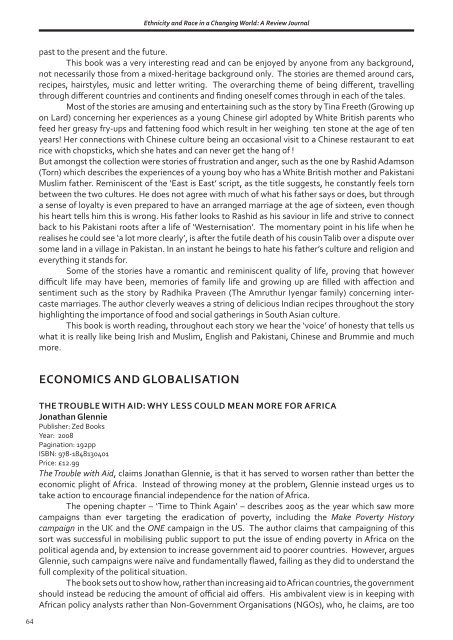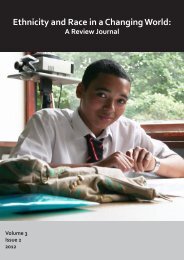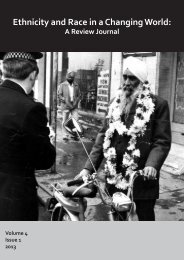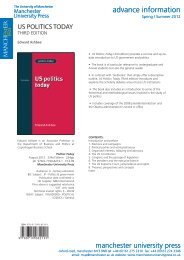Ethnicity and Race in a Changing World
Volume 2, Issue 1, 2010 - Manchester University Press
Volume 2, Issue 1, 2010 - Manchester University Press
- No tags were found...
You also want an ePaper? Increase the reach of your titles
YUMPU automatically turns print PDFs into web optimized ePapers that Google loves.
<strong>Ethnicity</strong> <strong>and</strong> <strong>Race</strong> <strong>in</strong> a Chang<strong>in</strong>g <strong>World</strong>: A Review Journalpast to the present <strong>and</strong> the future.This book was a very <strong>in</strong>terest<strong>in</strong>g read <strong>and</strong> can be enjoyed by anyone from any background,not necessarily those from a mixed-heritage background only. The stories are themed around cars,recipes, hairstyles, music <strong>and</strong> letter writ<strong>in</strong>g. The overarch<strong>in</strong>g theme of be<strong>in</strong>g different, travell<strong>in</strong>gthrough different countries <strong>and</strong> cont<strong>in</strong>ents <strong>and</strong> f<strong>in</strong>d<strong>in</strong>g oneself comes through <strong>in</strong> each of the tales.Most of the stories are amus<strong>in</strong>g <strong>and</strong> enterta<strong>in</strong><strong>in</strong>g such as the story by T<strong>in</strong>a Freeth (Grow<strong>in</strong>g upon Lard) concern<strong>in</strong>g her experiences as a young Ch<strong>in</strong>ese girl adopted by White British parents whofeed her greasy fry-ups <strong>and</strong> fatten<strong>in</strong>g food which result <strong>in</strong> her weigh<strong>in</strong>g ten stone at the age of tenyears! Her connections with Ch<strong>in</strong>ese culture be<strong>in</strong>g an occasional visit to a Ch<strong>in</strong>ese restaurant to eatrice with chopsticks, which she hates <strong>and</strong> can never get the hang of !But amongst the collection were stories of frustration <strong>and</strong> anger, such as the one by Rashid Adamson(Torn) which describes the experiences of a young boy who has a White British mother <strong>and</strong> PakistaniMuslim father. Rem<strong>in</strong>iscent of the ‘East is East’ script, as the title suggests, he constantly feels tornbetween the two cultures. He does not agree with much of what his father says or does, but througha sense of loyalty is even prepared to have an arranged marriage at the age of sixteen, even thoughhis heart tells him this is wrong. His father looks to Rashid as his saviour <strong>in</strong> life <strong>and</strong> strive to connectback to his Pakistani roots after a life of ‘Westernisation’. The momentary po<strong>in</strong>t <strong>in</strong> his life when herealises he could see ‘a lot more clearly’, is after the futile death of his cous<strong>in</strong> Talib over a dispute oversome l<strong>and</strong> <strong>in</strong> a village <strong>in</strong> Pakistan. In an <strong>in</strong>stant he be<strong>in</strong>gs to hate his father’s culture <strong>and</strong> religion <strong>and</strong>everyth<strong>in</strong>g it st<strong>and</strong>s for.Some of the stories have a romantic <strong>and</strong> rem<strong>in</strong>iscent quality of life, prov<strong>in</strong>g that howeverdifficult life may have been, memories of family life <strong>and</strong> grow<strong>in</strong>g up are filled with affection <strong>and</strong>sentiment such as the story by Radhika Praveen (The Amruthur Iyengar family) concern<strong>in</strong>g <strong>in</strong>tercastemarriages. The author cleverly weaves a str<strong>in</strong>g of delicious Indian recipes throughout the storyhighlight<strong>in</strong>g the importance of food <strong>and</strong> social gather<strong>in</strong>gs <strong>in</strong> South Asian culture.This book is worth read<strong>in</strong>g, throughout each story we hear the ‘voice’ of honesty that tells uswhat it is really like be<strong>in</strong>g Irish <strong>and</strong> Muslim, English <strong>and</strong> Pakistani, Ch<strong>in</strong>ese <strong>and</strong> Brummie <strong>and</strong> muchmore.ECONOMICS AND GLOBALISATIONTHE TROUBLE WITH AID: WHY LESS COULD MEAN MORE FOR AFRICAJonathan GlenniePublisher: Zed BooksYear: 2008Pag<strong>in</strong>ation: 192ppISBN: 978-1848130401Price: £12.99The Trouble with Aid, claims Jonathan Glennie, is that it has served to worsen rather than better theeconomic plight of Africa. Instead of throw<strong>in</strong>g money at the problem, Glennie <strong>in</strong>stead urges us totake action to encourage f<strong>in</strong>ancial <strong>in</strong>dependence for the nation of Africa.The open<strong>in</strong>g chapter – ‘Time to Th<strong>in</strong>k Aga<strong>in</strong>’ – describes 2005 as the year which saw morecampaigns than ever target<strong>in</strong>g the eradication of poverty, <strong>in</strong>clud<strong>in</strong>g the Make Poverty Historycampaign <strong>in</strong> the UK <strong>and</strong> the ONE campaign <strong>in</strong> the US. The author claims that campaign<strong>in</strong>g of thissort was successful <strong>in</strong> mobilis<strong>in</strong>g public support to put the issue of end<strong>in</strong>g poverty <strong>in</strong> Africa on thepolitical agenda <strong>and</strong>, by extension to <strong>in</strong>crease government aid to poorer countries. However, arguesGlennie, such campaigns were naïve <strong>and</strong> fundamentally flawed, fail<strong>in</strong>g as they did to underst<strong>and</strong> thefull complexity of the political situation.The book sets out to show how, rather than <strong>in</strong>creas<strong>in</strong>g aid to African countries, the governmentshould <strong>in</strong>stead be reduc<strong>in</strong>g the amount of official aid offers. His ambivalent view is <strong>in</strong> keep<strong>in</strong>g withAfrican policy analysts rather than Non-Government Organisations (NGOs), who, he claims, are too64






